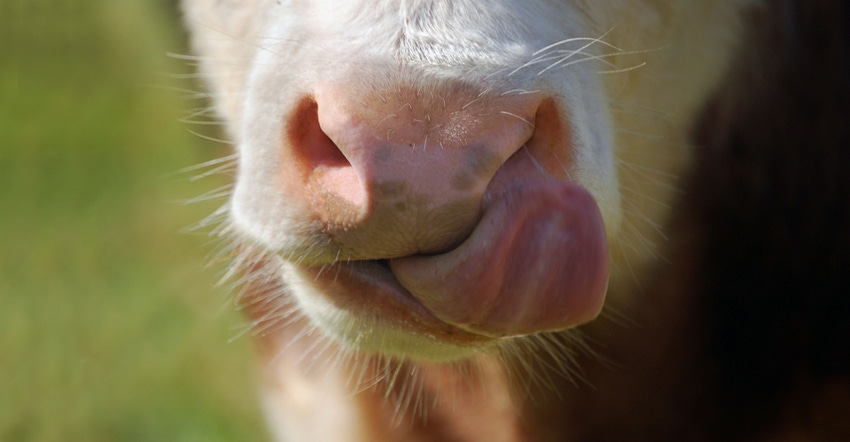Feeling the stress of an endless to-do list? As calves are weaned this fall, they may also experience stress as they encounter significant life changes. Increased saliva production can help with both getting and keeping calves on feed.
November 1, 2018

Sponsored Content
The fall season is approaching an end, and you may be feeling the stress of a seemingly endless to-do list between field work, cattle work or other duties. Calves may experience a similar feeling of stress at this time of the year, particularly while weaning, as they encounter some really big changes. Oftentimes, stressed calves have reduced feed intake and an increase in stress hormone levels. This can have a deleterious effect on the immune system, which may result in weight loss and sick calves.
A potential solution to help reduce the risk of sick calves and keep them on feed is to increase saliva production. Saliva is often taken for granted, but it plays an important role in nutrient breakdown and the overall digestive processes, and it also encourages further consumption of the diet. Cattle produce between 10 to 45 gallons of saliva per day. The exact volume depends on what type of feedstuff is being consumed and the amount of time spent ruminating. Roughage-based diets increase saliva production because of increased rumination activity, whereas concentrate-based diets reduce the amount of saliva produced.
But what if your recently weaned calves aren’t hitting the feed bunks like they should? Utilizing self-fed supplements during weaning is advantageous not only for obtaining valuable nutrients, but also through the licking action itself. When self-fed supplements are provided to both cows and calves prior to weaning, the familiarity of the products is of great benefit to calves during the weaning period. If calves aren’t provided self-fed supplements before weaning, strategically place them around the perimeter of the pen so they can notice them as they wander through the yard. Because of their curious nature, calves will soon find themselves licking the palatable product. And as calves lick, they produce more saliva.
You may be wondering why saliva is so important. Its production is a key player to getting calves on feed through many advantageous functions:
Functions of saliva:
1. Lubrication and taste: Saliva facilitates mastication (chewing) and swallowing of the bolus. It also aids in the regurgitation of the cud for further chewing and mixing with saliva.
2. Enzymatic activity: Saliva contains lipases (enzymes that break down fat) that preferentially hydrolyze short-chain fatty acids from triglycerides as well as amylase, which begins the breakdown of starch.
3. Source of nutrients for ruminal microorganisms: Mucoprotein and urea serve as nitrogen sources and are involved in nitrogen recycling. Electrolytes in saliva, particularly sodium, are growth factors for ruminal bacteria. Keeping the rumen microbes healthy and functioning will contribute to healthier, more efficient calves.
4. Influence nutrient removal rate from the rumen: Saliva is an important contributor to the fluidity of ruminal contents. This encourages calves to keep eating as the rate of passage out of the rumen increases and for nutrient absorption into the bloodstream to be accomplished at a faster rate.
5. Buffering capacity: This is a major function of saliva as bicarbonate and phosphate buffers the pH levels in the reticulum and rumen. Bicarbonate is a buffering agent not produced in the rumen and naturally found in saliva. Sodium bicarbonate may be added to diets or supplements to prevent a drastic drop in ruminal pH. Phosphates of the saliva neutralize acids produced in the rumen and help to maintain a pH above acidotic levels.
6. Antifoaming agent: Mucin, found in saliva, is an effective anti-foaming agent and plays a role in preventing bloat. An increase in saliva results in greater mucin production and decreases the risk of bloat.
7. Source of antibodies: Saliva conveys antibodies to the rumen, although the extent of its significance is not fully known at this time. A recent study measured greater immunoglobulin A (IgA) levels in saliva compared to serum and were relatively stable in rumen contents measured in both sheep and cattle.
Bartley, E.E. 1976. p. 61-81. In: Buffers in Ruminant Physiology and Metabolism. M.S.
Weinburg and A.L. Sheffner (Ed.), Church and Dwight, Inc., N.Y.
Increased saliva production is just one of the many great benefits of offering CRYSTALYX® self-fed supplements. Products such as Brigade® or Blueprint® Battalion® have been specifically fortified with pre- and post-weaned calves in mind. CRYSTALYX Brand Supplements offer an around-the-clock, highly palatable source of protein, energy, minerals and vitamins and will stimulate saliva production, enhance intake and increase digestibility — all while saving you time and labor. Don’t wean your calves without first rolling out a barrel!
About the Author(s)
You May Also Like



